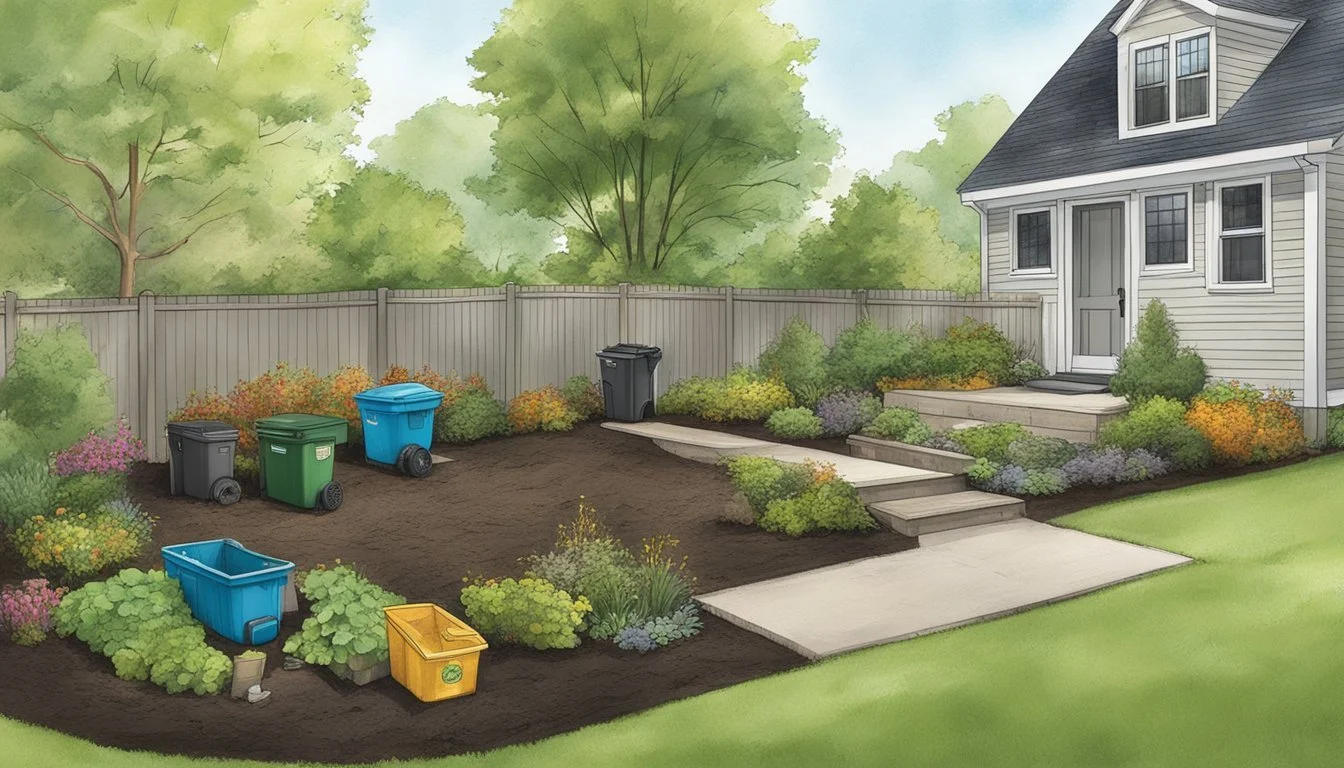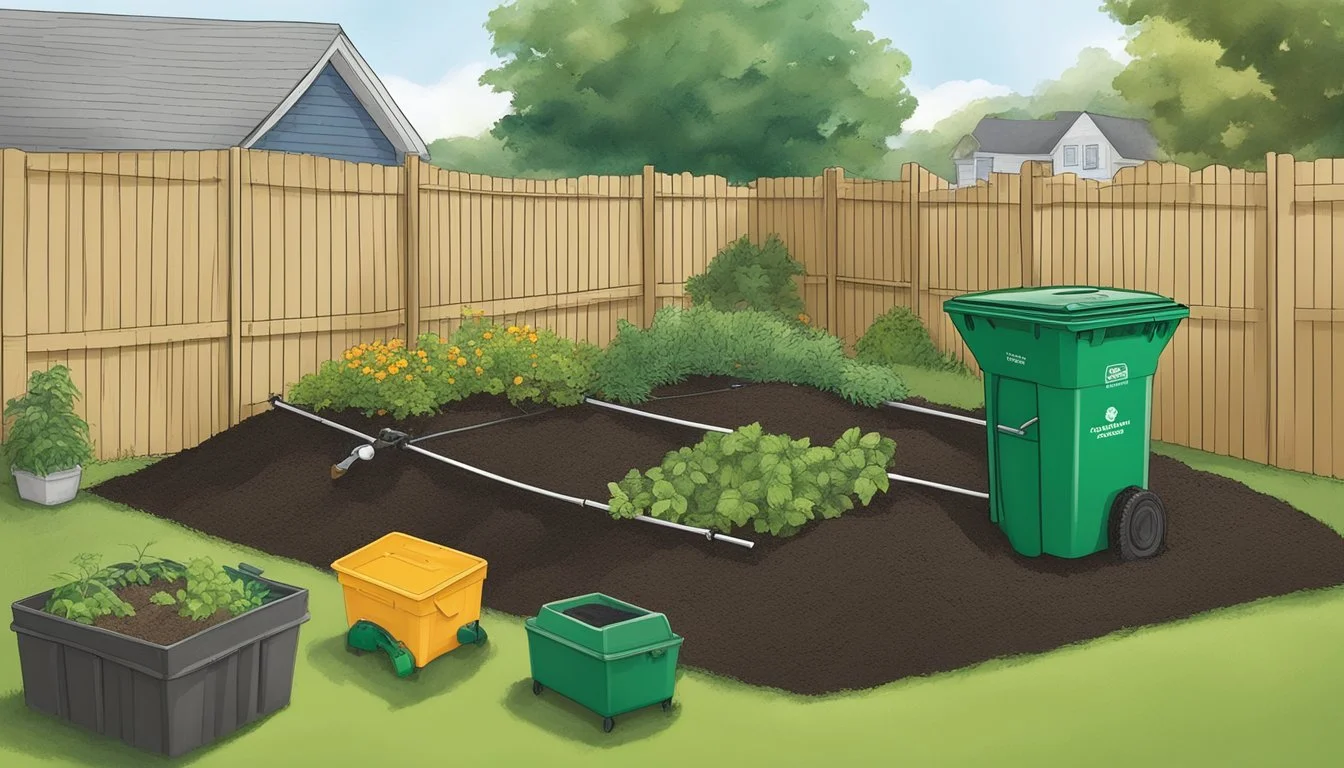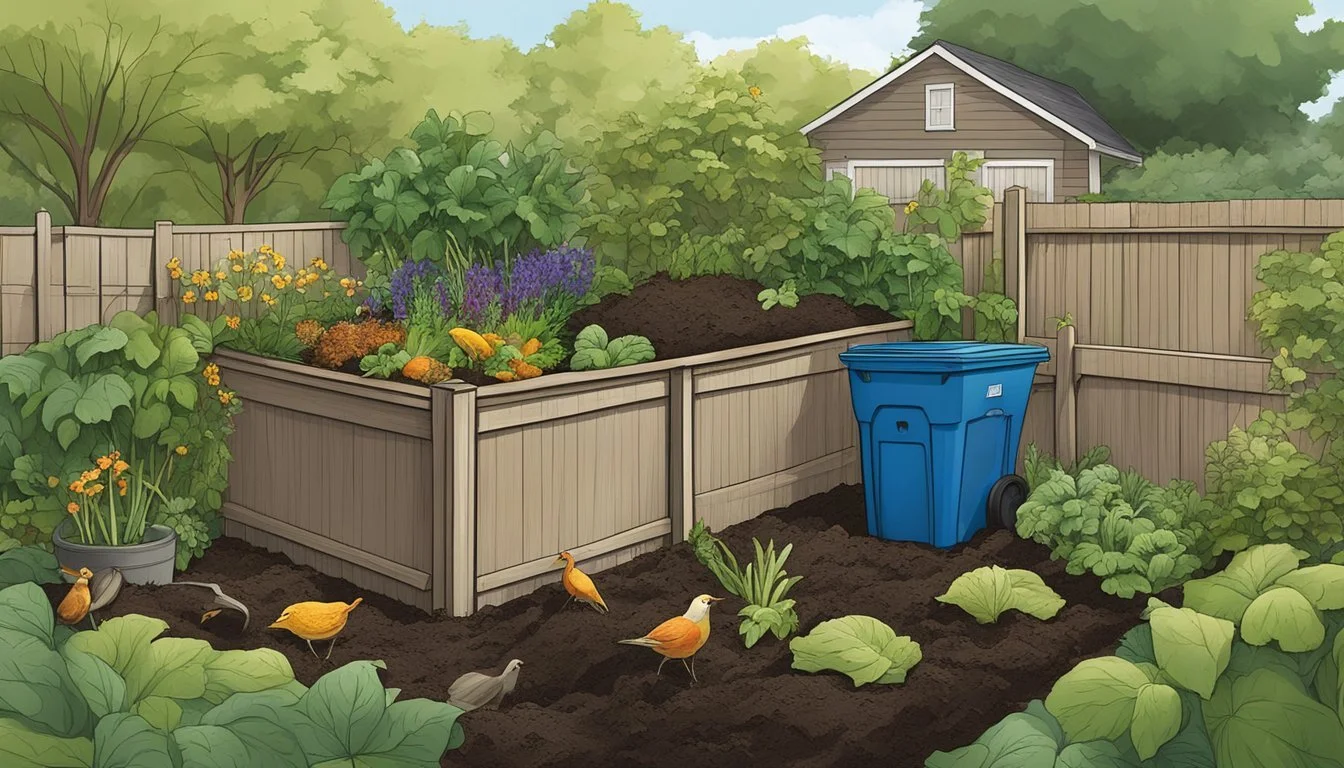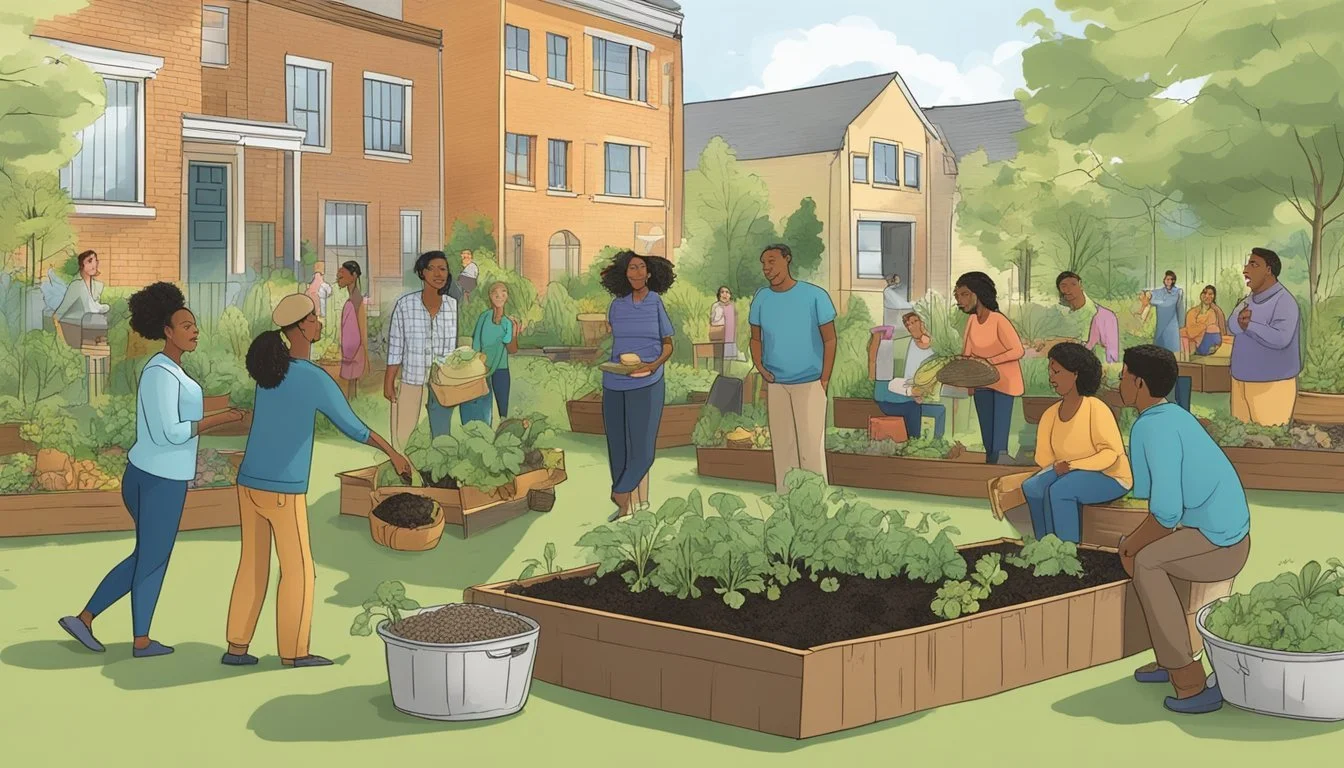Guide to Composting in Hartford, CT
Essential Tips for Eco-Friendly Waste Reduction
Composting offers a sustainable solution for managing organic waste, and in Hartford, Connecticut, residents and businesses alike can contribute to a greener environment through various composting opportunities. With a focus on reducing landfill waste and enhancing soil quality, composting transforms organic materials like food scraps and yard waste into valuable soil amendments. In Hartford, initiatives and services are in place to support and educate locals on how to compost effectively, making it a practical component of daily waste management.
The Connecticut Department of Energy and Environmental Protection (CT DEEP) actively promotes composting and provides resources tailored to assist schools, households, and businesses in adopting the practice. Programs such as school composting are designed to educate young learners and encourage future generations to cultivate responsible waste habits. Moreover, services like Blue Earth Compost provide convenient residential pick-up services, underscoring the accessibility of composting within Hartford.
Understanding the basics of composting is crucial for success, from selecting an appropriate composting site to maintaining the right balance of green and brown materials. The process not only benefits environmental health by reducing greenhouse gases but also enriches Connecticut soil, fostering more robust plant growth. Embracing composting in Hartford contributes to a thriving circular economy, where organic waste is no longer seen as refuse but as a resource full of potential.
The Basics of Composting
Composting is a natural process that transforms organic waste into valuable fertilizer. It offers numerous benefits for both home gardeners and the environment.
What Is Composting?
Composting is the controlled decomposition of organic materials such as leaves, yard trimmings, and food waste. This decomposition is facilitated by microorganisms such as bacteria and fungi, which break down the materials into soil conditioner. Properly prepared compost is nutrient-rich and can greatly enhance garden and plant growth.
Benefits of Composting
Composting at home is a simple way to reduce one's waste footprint. It converts organic refuse into a resource, decreasing the amount of garbage sent to landfills. For garden enthusiasts in Hartford, CT, using compost can improve soil structure, water retention, and provide plants with essential nutrients.
Reduction in waste volume: Home composting can divert up to 30% of household waste.
Soil enhancement: Compost enriches the soil, helping plants grow stronger and healthier.
Composting and Environmental Impact
The environmental impact of composting is predominantly positive. By recycling organic waste into compost, it helps to reduce methane emissions from landfills, conserves water by helping the soil retain moisture, and replaces chemical fertilizers, which can be harmful to the environment.
Reduced greenhouse gas emissions: Composting helps decrease landfill methane production.
Soil conservation: Adding compost improves soil health and can prevent soil erosion.
Starting Your Home Compost System
When embarking on home composting, Hartford, CT residents will benefit from understanding the essentials of choosing the right bin, balancing compost materials, and maintaining proper moisture and aeration.
Choosing a Compost Bin
Selecting the appropriate compost bin is crucial for a successful composting operation. Residents have the option to build their own bin or purchase a ready-made container. Bins should have ample space to accommodate food scraps and lawn debris while allowing for easy access to turn the compost. For Hartford dwellers, the state-sponsored Home Composting program provides valuable information on bin types suitable for different households.
Balancing Greens and Browns
Compost requires a careful balance of nitrogen-rich 'greens' and carbon-rich 'browns'. Greens include kitchen food scraps and lawn clippings, whereas browns can be dry leaves or straw. The ideal ratio is about one part green to three parts brown to ensure fast and effective decomposition.
Greens:
Vegetable and fruit scraps
Coffee grounds
Fresh lawn clippings
Browns:
Dry leaves
Cardboard
Twigs
Managing Compost Moisture and Aeration
Proper moisture and aeration are pivotal for compost health. The pile should be damp like a wrung-out sponge but not waterlogged. If the pile is too dry, periodically adding water will help. Turning the compost regularly ensures necessary oxygen flow, aiding in the breakdown of organic materials. The Connecticut DEEP offers educational resources, including a Compost Video Downloads section, for residents to learn more about managing compost conditions.
Moisture Check:
Squeeze a handful of compost; a few drops of water should ooze out.
If too wet, add more browns. If too dry, sprinkle with water.
Aeration:
Turn compost with a pitchfork or shovel every 1-2 weeks.
Ensure the bin has ventilation holes if using a closed container.
Composting in Hartford: Regulations and Resources
In Hartford, Connecticut, composting practices are supported by a network of regulations and local resources designed to aid community members in sustainable waste management. Municipal guidelines ensure environmental compliance, while various community-driven events promote active participation in composting efforts.
Hartford Composting Regulations
The City of Hartford follows Connecticut's state-wide regulations for composting which mandates the separation of organic materials from trash to facilitate recycling. Residents and businesses must adhere to specific Organics Recycling standards set forth by the Connecticut Department of Energy and Environmental Protection (CT DEEP). Permits are required for large-scale composting operations, ensuring that facilities manage organic waste responsibly and in accordance with state regulations.
For smaller-scale, residential composting, the state provides guidance rather than stringent rules, allowing homeowners to compost on their property without a permit. However, it is essential they do so without causing nuisance or environmental harm.
Local Composting Resources
Hartford residents have access to a wealth of resources including tutorials and guidelines provided on the CT DEEP portal. These online materials not only offer information on how to start and maintain a composting system but also detail how to contribute to Connecticut's larger sustainable waste ecosystem.
Local organizations such as the Connecticut Compost Alliance serve as a hub for composting information and networking, guiding residents through the process and encouraging best practices in organic recycling.
Community Involvement and Events
Community involvement is central to Hartford's approach to composting. Educational initiatives and composting workshops are regularly held to engage citizens. There are also events that bring together composting enthusiasts to share tips and strategies.
The CT Compost Alliance, in tandem with state agencies and businesses, plays a key role in organizing events that cater to both beginners and seasoned composters. These events foster a sense of camaraderie among community members, thereby reinforcing Hartford's commitment to environmental stewardship and sustainable practices.
Reducing Food Waste
Effective management of food waste is critical, both as a resource-saving measure and as a way to lessen environmental impact. Whether it's in our homes, businesses, or schools, the strategies applied can transform waste into a valuable resource, offering comprehensive solutions across various sectors.
Home Strategies for Reducing Food Waste
At home, individuals can take several actionable steps to minimize food waste. Planning meals in advance ensures that only the necessary items are purchased, which reduces the chance of food spoilage. Implementing first-in, first-out organization in the refrigerator allows older items to be used before newer ones. For perishable produce and leftovers, proper storage is key, utilizing airtight containers or freezer storage to extend their usability. Additionally, composting organic leftovers turns food scraps into a resource for enhancing soil, which can be easily done with resources provided by the Connecticut Department of Energy & Environmental Protection.
Food Waste Reduction in Businesses and Schools
Businesses and schools play a significant role in reducing food waste through structured programs and education. Restaurants and caterers can partner with food rescue programs, ensuring surplus prepared foods reach those in need instead of landfills. The Connecticut Food Bank is instrumental in facilitating such connections. In the educational sector, schools can incorporate waste management into their curriculum and establish composting systems onsite. By doing so, they not only reduce food waste but also impart valuable life lessons on responsibility and sustainability. A concrete example is the initiative by Connecticut DEEP, providing a School Composting Manual to promote these practices.
Businesses and schools are encouraged to conduct regular waste audits to identify the majority of their waste streams and devise targeted strategies for reduction.irms and educational institutions alike can repurpose food waste as a resource that supports broader sustainable practices.
Composting Beyond the Home
In Hartford, Connecticut, expanding composting practices beyond household activities is gaining momentum. With several programs and initiatives, they actively involve municipal efforts, enrich educational experiences in public schools, and engage community members in sustainable waste management strategies.
Municipal Composting Programs
The City of Hartford embraces organics recycling with public composting programs designed to divert waste from landfills and repurpose it as nutritious soil amendments. These municipal initiatives play a crucial role in the city's broader recycling goals, promoting environmental stewardship and resource efficiency. Entities like the Connecticut Department of Energy and Environmental Protection (DEEP) provide valuable resources and guidance for individuals and businesses to participate in composting efforts.
School and Community Composting Initiatives
Education is a pillar of Hartford's approach to composting, with public schools incorporating compost programs into their curricula. The Connecticut Compost Alliance collaborates with educational institutions to foster a generation of environmentally conscious students. Additionally, community composting initiatives facilitate participation in shared composting endeavors, strengthening community bonds and collective commitment to environmental sustainability.
Advanced Topics in Composting
In Hartford, CT, advancing beyond backyard composting opens a world of opportunities for sustainable waste management and soil enhancement. Large-scale operations and technological innovations are at the forefront of this green revolution.
Large-Scale Composting Operations
Large-scale composting operations are instrumental in transforming the organic waste of urban centers into valuable compost. Hartford’s large-scale leaf composting programs serve as critical components of the city’s recycling efforts. They divert leaves from landfills and convert them into nutrient-rich compost, contributing to soil health on farms and public spaces. The scale of these operations requires meticulous planning, a deep understanding of composting science, and a robust infrastructure to handle and process vast quantities of organic material.
Innovations in Composting Technology
Innovations in composting technology are reshaping how Hartford approaches organic waste. With advances in composting systems, such as in-vessel composters and aerated windrow systems, the city can compost more efficiently, control odors more effectively, and produce higher quality compost at a faster rate. These technologies also make it feasible to compost a wider range of materials, including food scraps from restaurants and grocers, which traditionally might have been more challenging to process. This technological progress supports sustainable practices by enhancing compost production and usage, thereby closing the loop in the organic waste cycle.
Networking and Partnerships
In Hartford, CT, the practice of composting is supported by a robust network of alliances and partnerships that contribute to the growth and effectiveness of sustainable waste management.
Local and Regional Composting Alliances
One of the key players in the Connecticut composting network is the Connecticut Compost Alliance, a coalition dedicated to promoting and educating on composting activities within the state. Stakeholders in this alliance include non-profit organizations, businesses, and state and federal agencies that are uniformly enthusiastic about the benefits of aerobic composting. Through collaboration and shared resources, they facilitate a unified approach to addressing organics recycling.
Composting Advocacy and Expansion Efforts
To reinforce the importance of composting, various efforts are directed towards advocacy and expansion. One such effort is led by CT DEEP, which focuses its initiatives on large-scale leaf composting as part of its organics recycling program. The agency plays an instrumental role in solidifying regional partnerships and enhancing composting networks by sharing knowledge and resources across Connecticut, including in Hartford. These efforts signal the commitment to turn organic materials, often perceived as waste, into valuable resources through systematic composting practices.
Composting Best Practices
In Hartford, CT, one can transform organic waste into nutrient-rich soil through effective composting techniques. These best practices aim to maximize decomposing efficiency while minimizing common pitfalls.
Maintaining Compost Quality
Balance: It is essential to balance 'green' nitrogen-rich materials like food scraps and 'brown' carbon-rich materials like dried leaves in your compost. The Connecticut Compost Alliance suggests a ratio of roughly 1 part greens to 3 parts browns to maintain a healthy compost.
Size: Reducing the size of compost materials hastens decomposition. Smaller pieces provide more surface area for microbes to do their work.
Aeration: Regularly turning the compost ensures oxygen penetration, which is fundamental for aerobic decomposition and prevents odor. As indicated by CT DEEP recommendations, one should mix the pile every few weeks.
Moisture: Compost should be moist, like a wrung-out sponge. If too dry, add water; if too wet, add more browns to absorb excess moisture.
Location: Place your compost in an area with good drainage and partial shade to maintain consistent temperature and moisture levels.
Troubleshooting Common Compost Issues
Odors: Bad smells often signal an imbalance, typically an excess of greens. Add more browns and aerate the pile to reintroduce oxygen. If odors persist, CT.gov's Home Composting page has more detailed guidance.
Pests: To prevent attracting animals, avoid adding meats, bones, or fatty foods to your compost and cover new additions with browns. Securing the pile with a wire mesh can deter rodents.
Slow Decomposition: If the pile is not heating up, it might need more nitrogen (greens), water, or aeration. Chop materials into smaller pieces to speed up the process.
Too Wet: Excessive rain or overwatering can lead to a soggy pile. Add browns, turn the pile for aeration, and consider covering it to prevent overhydration.
Conclusion
This final section encapsulates the essentials of composting practices in Hartford and projects the anticipated advancement across Connecticut.
Summary of Composting in Hartford
In Hartford, composting has taken robust strides with considerable community involvement and benefits to the soil's health. Residents utilize techniques learned from resources such as Composting and Organics Recycling to reduce waste and return nutrients to the earth. The city's commitment is reflected through educational resources like A Quick Guide to Composting, ensuring that individuals are well-informed about the composting process. Programs implemented not only encourage sustainable waste management but also foster a sense of ecological responsibility within the community.
Future of Composting in Connecticut
Looking ahead, Connecticut's composting initiative is poised for growth. The Connecticut Compost Alliance exemplifies the collective drive towards a greener future, taking concerted action to spread composting knowledge and practice. With a focus on both home and school composting, Connecticut is nurturing an environment that underscores the significance of reusing organic waste. The expectation is that, with ongoing education and state encouragement, composting will become a mainstream practice, engrained in the lifestyle of Connecticut's residents and beneficial for the state's soil and ecology for years to come.








